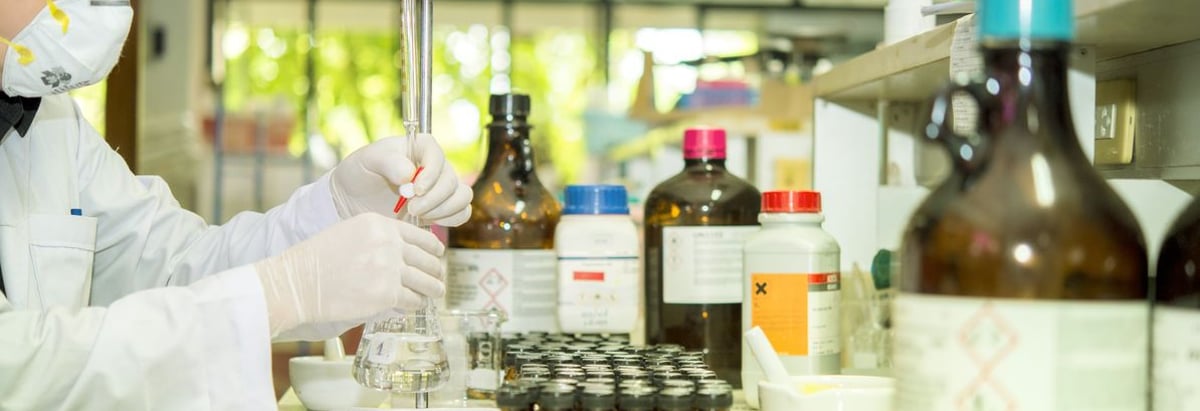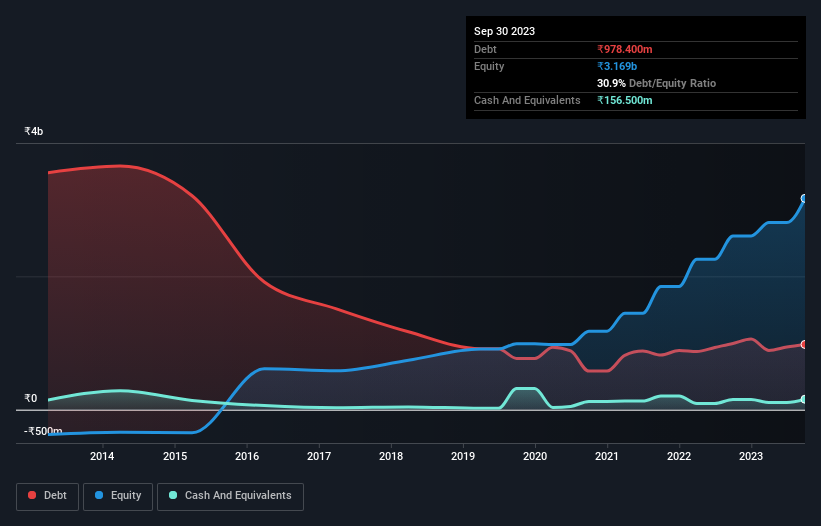Punjab Chemicals and Crop Protection (NSE:PUNJABCHEM) Has A Somewhat Strained Balance Sheet

Howard Marks put it nicely when he said that, rather than worrying about share price volatility, 'The possibility of permanent loss is the risk I worry about... and every practical investor I know worries about.' So it seems the smart money knows that debt - which is usually involved in bankruptcies - is a very important factor, when you assess how risky a company is. Importantly, Punjab Chemicals and Crop Protection Limited (NSE:PUNJABCHEM) does carry debt. But should shareholders be worried about its use of debt?
What Risk Does Debt Bring?
Debt and other liabilities become risky for a business when it cannot easily fulfill those obligations, either with free cash flow or by raising capital at an attractive price. In the worst case scenario, a company can go bankrupt if it cannot pay its creditors. However, a more frequent (but still costly) occurrence is where a company must issue shares at bargain-basement prices, permanently diluting shareholders, just to shore up its balance sheet. By replacing dilution, though, debt can be an extremely good tool for businesses that need capital to invest in growth at high rates of return. The first thing to do when considering how much debt a business uses is to look at its cash and debt together.
View our latest analysis for Punjab Chemicals and Crop Protection
What Is Punjab Chemicals and Crop Protection's Net Debt?
As you can see below, Punjab Chemicals and Crop Protection had ₹978.4m of debt, at September 2023, which is about the same as the year before. You can click the chart for greater detail. However, it also had ₹156.5m in cash, and so its net debt is ₹821.9m.

How Healthy Is Punjab Chemicals and Crop Protection's Balance Sheet?
The latest balance sheet data shows that Punjab Chemicals and Crop Protection had liabilities of ₹2.53b due within a year, and liabilities of ₹881.7m falling due after that. Offsetting this, it had ₹156.5m in cash and ₹2.05b in receivables that were due within 12 months. So its liabilities total ₹1.21b more than the combination of its cash and short-term receivables.
Since publicly traded Punjab Chemicals and Crop Protection shares are worth a total of ₹16.4b, it seems unlikely that this level of liabilities would be a major threat. But there are sufficient liabilities that we would certainly recommend shareholders continue to monitor the balance sheet, going forward.
We measure a company's debt load relative to its earnings power by looking at its net debt divided by its earnings before interest, tax, depreciation, and amortization (EBITDA) and by calculating how easily its earnings before interest and tax (EBIT) cover its interest expense (interest cover). This way, we consider both the absolute quantum of the debt, as well as the interest rates paid on it.
While Punjab Chemicals and Crop Protection's low debt to EBITDA ratio of 0.63 suggests only modest use of debt, the fact that EBIT only covered the interest expense by 6.8 times last year does give us pause. So we'd recommend keeping a close eye on the impact financing costs are having on the business. On the other hand, Punjab Chemicals and Crop Protection saw its EBIT drop by 9.0% in the last twelve months. If earnings continue to decline at that rate the company may have increasing difficulty managing its debt load. The balance sheet is clearly the area to focus on when you are analysing debt. But it is Punjab Chemicals and Crop Protection's earnings that will influence how the balance sheet holds up in the future. So when considering debt, it's definitely worth looking at the earnings trend. Click here for an interactive snapshot.
Finally, a business needs free cash flow to pay off debt; accounting profits just don't cut it. So we always check how much of that EBIT is translated into free cash flow. In the last three years, Punjab Chemicals and Crop Protection created free cash flow amounting to 3.6% of its EBIT, an uninspiring performance. For us, cash conversion that low sparks a little paranoia about is ability to extinguish debt.
Our View
Neither Punjab Chemicals and Crop Protection's ability to convert EBIT to free cash flow nor its EBIT growth rate gave us confidence in its ability to take on more debt. But its net debt to EBITDA tells a very different story, and suggests some resilience. Looking at all the angles mentioned above, it does seem to us that Punjab Chemicals and Crop Protection is a somewhat risky investment as a result of its debt. Not all risk is bad, as it can boost share price returns if it pays off, but this debt risk is worth keeping in mind. In light of our reservations about the company's balance sheet, it seems sensible to check if insiders have been selling shares recently.
Of course, if you're the type of investor who prefers buying stocks without the burden of debt, then don't hesitate to discover our exclusive list of net cash growth stocks, today.
New: Manage All Your Stock Portfolios in One Place
We've created the ultimate portfolio companion for stock investors, and it's free.
• Connect an unlimited number of Portfolios and see your total in one currency
• Be alerted to new Warning Signs or Risks via email or mobile
• Track the Fair Value of your stocks
Have feedback on this article? Concerned about the content? Get in touch with us directly. Alternatively, email editorial-team (at) simplywallst.com.
This article by Simply Wall St is general in nature. We provide commentary based on historical data and analyst forecasts only using an unbiased methodology and our articles are not intended to be financial advice. It does not constitute a recommendation to buy or sell any stock, and does not take account of your objectives, or your financial situation. We aim to bring you long-term focused analysis driven by fundamental data. Note that our analysis may not factor in the latest price-sensitive company announcements or qualitative material. Simply Wall St has no position in any stocks mentioned.
About NSEI:PUNJABCHEM
Punjab Chemicals and Crop Protection
Manufactures and sells agrochemicals, specialty chemicals, bulk drugs, and related intermediates in India, Europe, Japan, Israel, the United States, Latin America, and internationally.
Excellent balance sheet with questionable track record.
Similar Companies
Market Insights
Community Narratives




